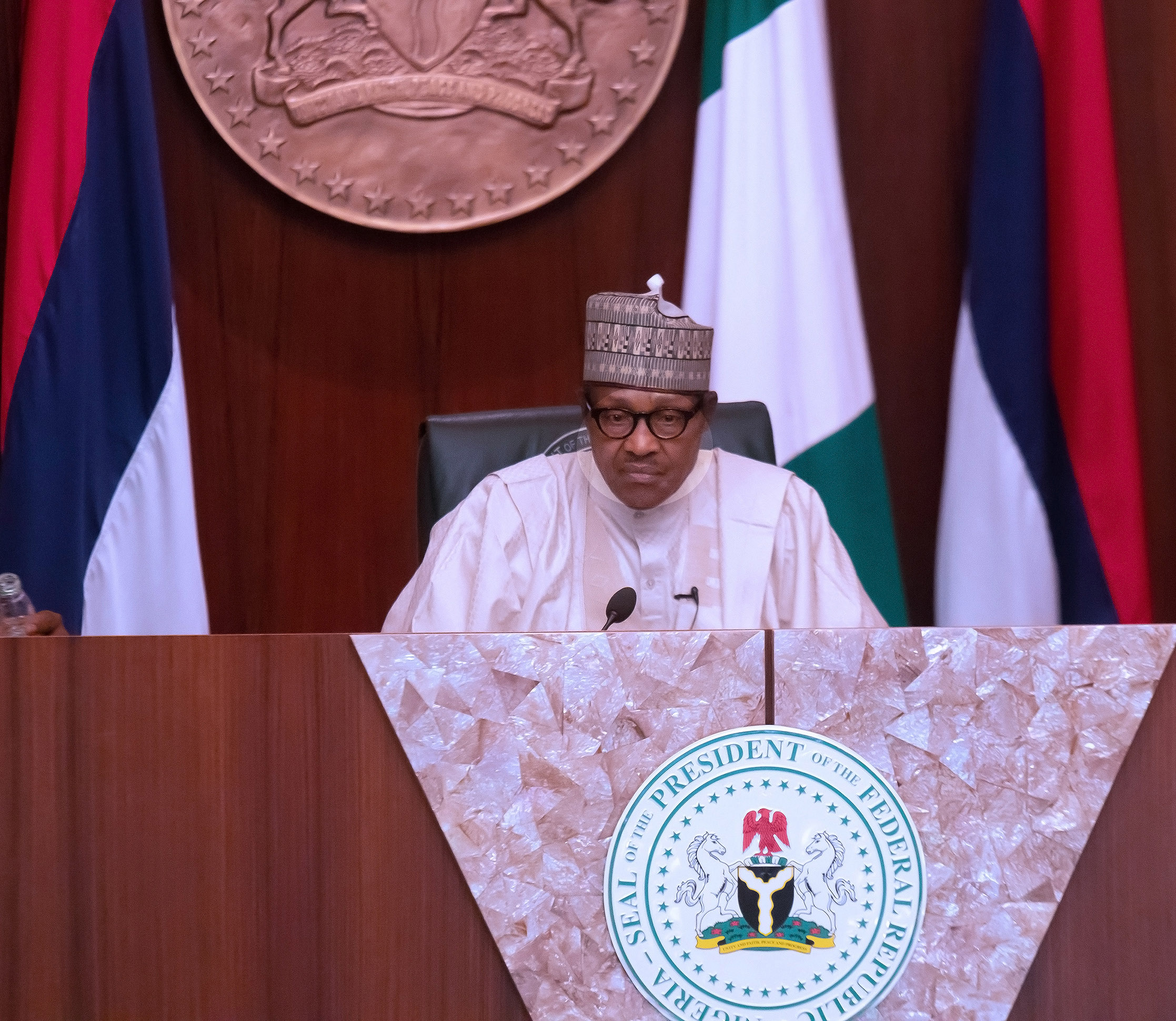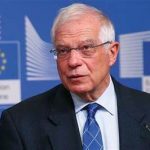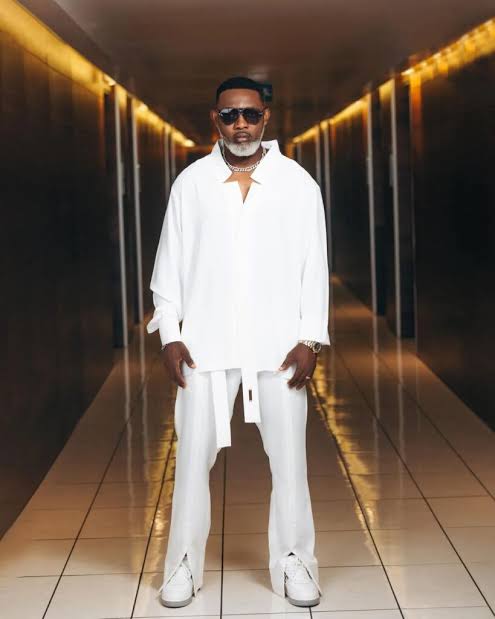lists strings of sectoral achievements
President Muhammadu Buhari on Friday chronicled his administration’s legion achievements in the nation’s tottering democratic journey with a novel acknowledgment of the media as an effective watchdog for the society and public officers.
Extolling the media, Buhari said their doggedness remained outstanding in the struggle for attainment of democracy since the beginning of nationhood while admitting imperfections in the media-government relationships.
In a broadcast to commemorate 21 years of democracy and first year of national “Democracy Day’’, Buhari said:“ I will also like to convey our deep appreciation to members of the Press for your doggedness in the struggle for attainment of democracy since the beginning of our nationhood.
“I must admit that the relationship between the media and successive governments has not always been perfect. But there is no denying the fact that you have been an effective watchdog for the society especially in holding public officers to account. It is sad that in the course of securing our democracy, some of your colleagues have had to pay a heavy price.’’
Giving a cast-iron assurance on free speech space, he said:“ We will continue to guarantee freedom of the Press as we place high premium on responsible journalism that is devoid of hate speech, fake news and other unethical professional conduct.’’
Persecondnews recalls that Buhari had in 2019 changed Democracy Day from inauguration day of May 29 to June 12, a watershed in the nation’s political and democracy history.
He formally recognized June 12 and honoured Abiola post-humously, represented by one of his sons, Kola and other heroes and heroines of the struggle.
The symbol and hero of democracy and the presumed winner of the June 12, 1993 Presidential election, Chief MKO Abiola had his election results annulled by the head of the junta, retired Gen. Ibrahim Babangida, his alter ego, an election that was adjudged globally as the freest, fairest and most successful Nigerian democratic process.
Abiola was arrested and detained by the maximum military ruler, the late Gen. Sani Abacha, for declaring himself president at Epetedo on Lagos Island.
He died under mysterious circumstances on July 7, 1998 in government custody in Abuja, a development which sparked nationwide violent protest.
Pro-democracy groups, progressive politicians and ordinary Nigerians had been struggling to get the federal government recognize June 12 as the Democracy Day.
In watermarking the day, Buhari said:“The 2020 celebration of Democracy Day marks 21 years of uninterrupted civil administration in our dear country. This day provides us an opportunity to reflect on our journey as a nation, our achievements and struggles. It is a day to honour our founding fathers who toiled to establish our republic and every Nigerian who has worked tirelessly to sustain it.
“Sustaining our democracy thus far has been a collective struggle, and I congratulate all Nigerians and particularly leaders of our democratic institutions on their resilience and determination to ensure that Nigeria remains a shining example of democracy.
“We are celebrating this year’s Democracy Day despite the COVID-19 pandemic which afflicts our nation and the whole world.
“ It is indeed a very difficult time for everyone especially those who have lost loved ones to the virus and those whose sources of livelihood have been severely constrained by the stringent measures we introduced at every level of government to contain the virus and save lives.’’
On the achievements of his administration since 2015, Buhari anchored them on the implemention of nine priority objectives which, he noted, had established a solid foundation for future success.
“On the economic front, our objectives have remained to stabilize the macro-economy, achieve agricultural and food security, ensure energy sufficiency in power and petroleum products, develop infrastructure, fight corruption and improve governance.
“ We have witnessed eleven quarters of consecutive GDP growth since exiting recession. The GDP grew from 1.91% in 2018 to 2.27% in 2019 but declined to 1.87% in the first quarter of 2020 as a result of the decline in global economic activities due to the COVID-19 pandemic.
“Every single economy in the world has suffered a decline. Ours has been relatively moderate. In order to stabilize the economy, the Monetary Authority took steps to build the external reserves which resulted in improved liquidity in the foreign exchange market. The external reserves grew from $33.42 billion on April 29th 2020 to about $36.00 billion in May, 2020 which is enough to finance seven months of import commitments.
“Agriculture remains the key to our economic diversification strategy. The Presidential Fertilizer Initiative programme continues to deliver significant quantities of affordable and high-quality fertilizers to our farmers. This initiative has also revived 31 blending plants and created a significant number of direct and indirect jobs across the value chain.
“Government is also revamping the cotton, textile and garment sector via a CBN Textile Revival Intervention Fund that would considerably reduce foreign exchange spent on cotton and other textile imports.
“Through the food security initiative, we are promoting “Grow What We Eat” and “Eat What We Grow”. I am also delighted that more and more Nigerians are taking advantage of the opportunities in the agriculture and agri-business sector. I assure you that government will continue to support the Agriculture sector through the CBN Anchor Borrowers Programme and similar schemes.
“To protect our farming investments, we have deployed 5,000 Agro-Rangers and employed 30,289 in our para-military agencies. We are also integrating rural communities to the formal economy by extending access to credit and inputs to rural farmers and building feeder roads,’’ the president, a retired Major-General, said.
On non-oil exports, Buhari said govermment’s efforts have started yielding some results, pointing out that in the past year, revenue from Cocoa and Sesame Seed increased by $79.4 million and $153 million.
He stressed: “Africa presents a huge opportunity for our export base diversification and we are developing our strategy to grow intra-Africa trade through the Africa Continental Free Trade Area Agreement.
“Nigeria has risen by 25 places on the World Bank’s Ease of Doing Business ranking from 146th to 131st and is now rated as one of the top ten reforming countries. This development is due to the Visa on Arrival policy, consistent promotion of initiatives that expand facilities available to Micro Small and Medium Scale Enterprises, robust electronic registration and payment system, seamless processing of business registration and reduction of cost of registering business by 50%.
“We are confident that on-going efforts would result in further improvement of this rating.
“We remain committed to expanding our mining sector. To this end, I have directed the resuscitation of the Ajaokuta Steel Plant based on Government-to-Government financing and a Public-Private Sector financing.
“With foreign and domestic investments and the participation of Small Scale Miners, we are harnessing the supply value chain in gold production.’’
On the administration’s scorecard in the power sector, Buhari said the sector remained very critical to meeting the nation’s industrial development aspirations, giving commitment to tackling the challenges that still exist in the delivery of power through different strategies.
He restated:“ We are executing some critical projects through the Transmission Rehabilitation and Expansion Programme including the Alaoji to Onitsha, Delta Power Station to Benin and Kaduna to Kano, 330kv DC 62km line between Birnin Kebbi and Kamba, Lagos/Ogun Transmission Infrastructure Project,Abuja Transmission Ring Scheme and Northern Corridor Transmission Project.
“Our agreement with Siemens will transmit and distribute a total of 11,000 Megawatts by 2023, to serve our electricity needs.
“On transportation, another critical sector to improving our economic competitiveness, we are growing the stock and quality of our road, rail, air and water transport infrastructure. Through the SUKUK-Funded Road Projects, a total of 412km of the targeted 643km road projects have been completed, representing 64%.
“The Presidential Infrastructure Development Fund projects are also progressing very well. On the 2nd Niger Bridge, piling work has been completed and the approach roads are being constructed. 48% of work on this bridge has been achieved. We have constructed 102km of the 376km Abuja – Kaduna – Kano Road, representing 38%, and the 42.9km Obajana – Kabba Road is 87.03% complete.
“Furthermore, the Federal Roads Maintenance Agency has completed routine maintenance on over 4,000km of federal roads out of the 5,000km targeted.
“We are extending and upgrading our railway network too. We are introducing more locomotives, coaches and wagons for the Abuja-Kaduna Rail Line. The Central Ajaokuta – Itakpe – Warri Line has been completed and is being extended from Itakpe to Abuja on one end and from Warri Town to Warri Port on the other.
“The Lagos-Ibadan Rail Line is 90% completed and would be extended to the Lagos Port which would help address the long-standing grid-lock at the Apapa port.
“The Kano – Maradi Single Track Standard Gauge Railway, Coastal Railway Project and Port Harcourt – Maiduguri Standard Gauge Railway, with its associated branch lines running through the South Eastern and Gombe States, industrial park and Bonny Deep Sea Port are all ready for concessioning.
“Government continues to make investments in the Aviation sector to position it as a travel and trade hub in West Africa and the wider African continent.
“Airport Terminals in Abuja, Lagos, Kano and Port Harcourt are being expanded, while the rehabilitation of the Enugu Airport is almost completed. All our airports are being raised to international standards with the provision of necessary equipment, especially navigational aids, to guarantee world class safety standards.’’
On oil fields, Buhari said: “For the first time in over ten years, Nigeria is conducting bidding process for 57 Marginal Oil Fields to increase revenue and increase the participation of Nigerian companies in oil and exploration and production business.
“We continue to grow local content in other areas of the oil and gas sector with the disbursement of funds from the $200 million Nigerian Content Intervention Fund to indigenous manufacturers and service providers.’’
























Leave a comment